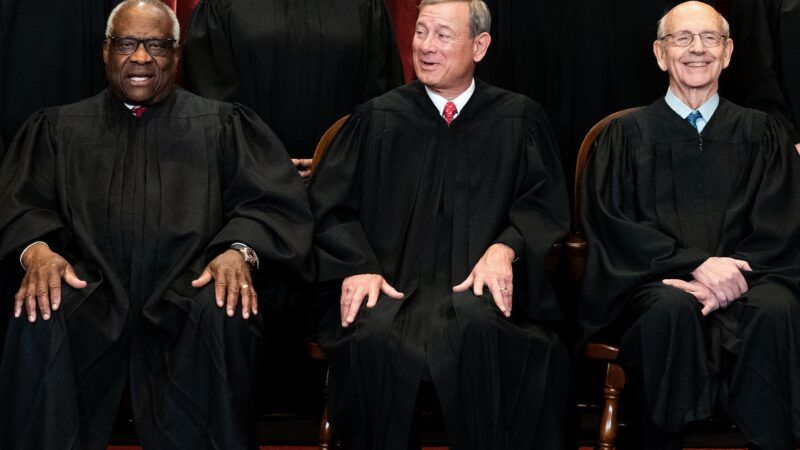High School Cheerleader's Profane Social Media Rant Is Protected Free Speech, Says SCOTUS
First Amendment advocates prevailed in Mahanoy Area School District v. B.L.

The U.S. Supreme Court ruled 8-1 today that a Pennsylvania public school district violated the First Amendment when it punished a high school freshman for posting a profane, off-campus rant on the social media site Snapchat about her failure to make the varsity cheerleading squad. "It might be tempting to dismiss [the cheerleader's] words as unworthy of…robust First Amendment protections," Justice Stephen Breyer wrote for the majority. "But sometimes it is necessary to protect the superfluous in order to preserve the necessary."
The matter of Mahanoy Area School District v. B.L. originated with these words: "Fuck school fuck softball fuck cheer fuck everything." They were posted to Snapchat on a Saturday night and were accompanied by a picture of B.L. (known by her initials in court filings because she was a minor at the time) and a friend with their middle fingers raised. To say the least, B.L.'s cheerleading coaches did not like that post when it was later brought to their attention. As punishment for it, B.L. was suspended from the junior varsity cheerleading team for a full year. The question before the Supreme Court was whether school officials may punish her for this off-campus speech.
The Supreme Court ruled today that the school may not. At the same time, however, the Court made it clear that its decision was not a sweeping one. In fact, the majority stressed that under certain circumstances, schools may punish students for speech that occurs off-campus. "Thus, we do not now set forth a broad, highly general First Amendment rule stating just what counts as 'off campus' speech and whether or how ordinary First Amendment standards must give way off campus," Breyer wrote for the majority.
Instead, Breyer made three more general points. First, "geographically speaking, off-campus speech will normally fall within the zone of parental, rather than school-related, responsibility." Second, "when it comes to political or religious speech that occurs outside school or a school program or activity, the school will have a heavy burden to justify intervention." And third, "the school itself has an interest in protecting a student's unpopular expression, especially when the expression takes place off campus." To that he added: "America's public schools are the nurseries of democracy. Our representative democracy only works if we protect the 'marketplace of ideas.'"
"Taken together," the opinion concluded, "these three features of much off-campus speech mean that the leeway the First Amendment grants to schools in light of their special characteristics is diminished. We leave for future cases to decide where, when, and how these features mean the speaker's off-campus location will make the critical difference."
The cheerleader won this time around, in other words, but future off-campus student speakers might well meet a different legal fate. The free speech side prevailed but it was a limited victory.
Justice Samuel Alito, joined by Justice Neil Gorsuch, joined the majority opinion in full but wrote separately to emphasize a few points. Among them was this:
there is a category of speech that is almost always beyond the regulatory authority of a public school. This is student speech that is not expressly and specifically directed at the school, school administrators, teachers, or fellow students and that addresses matters of public concern, including sensitive subjects like politics, religion, and social relations. Speech on such matters lies at the heart of the First Amendment's protection.
"Even if such speech is deeply offensive to members of the school community and may cause a disruption," Alito wrote, "the school cannot punish the student who spoke out; 'that would be a heckler's veto.'"
The sole dissenter today was Justice Clarence Thomas. In his view, "a more searching review reveals that schools historically could discipline students in circumstances like those presented here." In fact, Thomas faulted the majority for failing "to consider whether schools often will have more authority, not less, to discipline students who transmit speech through social media." As he put, "because off-campus speech made through social media can be received on campus (and can spread rapidly to countless people), it often will have a greater proximate tendency to harm the school environment than will an off-campus in-person conversation."
The Supreme Court's decision in Mahanoy Area School District v. B.L. is available here.


Show Comments (67)